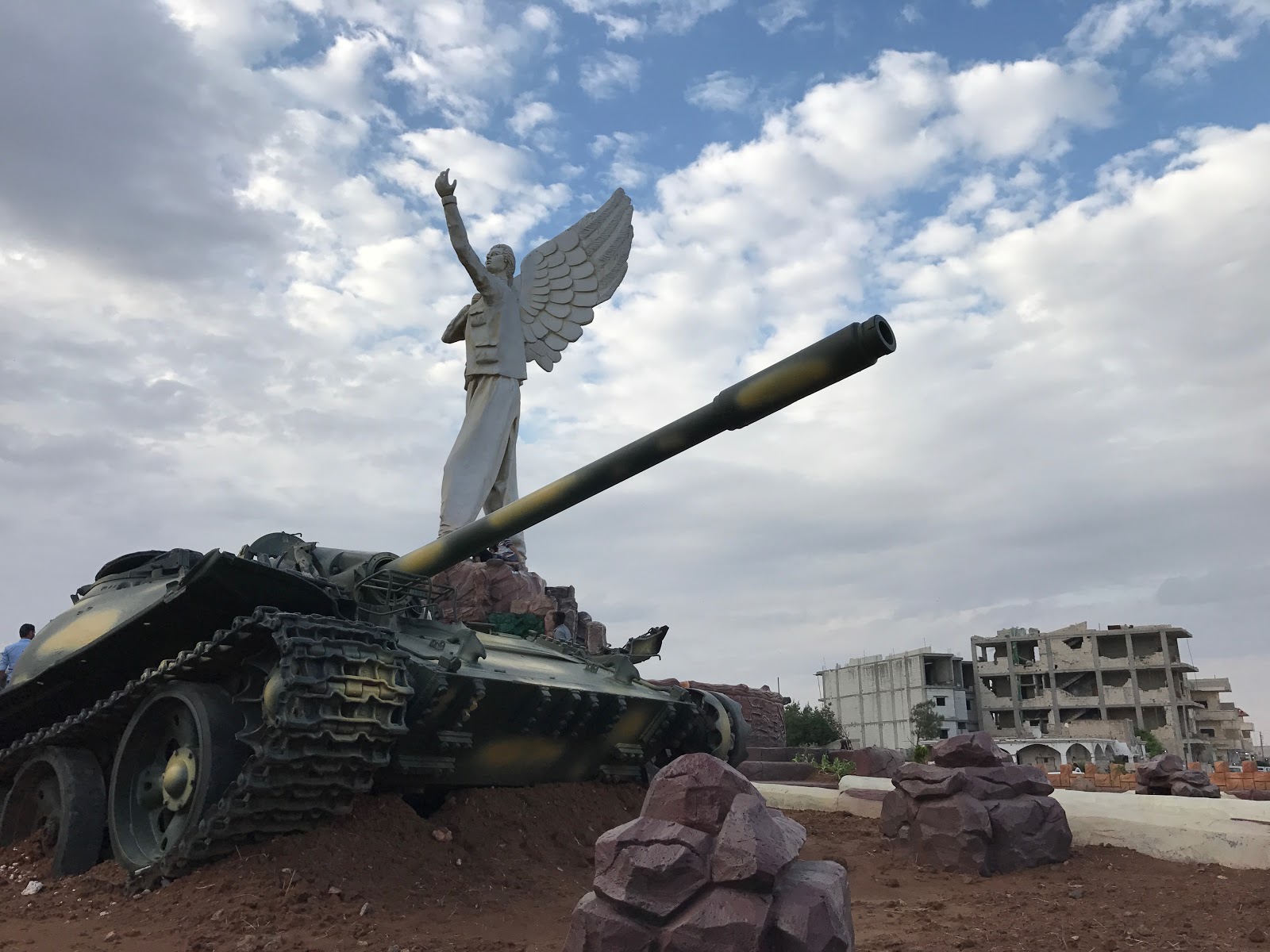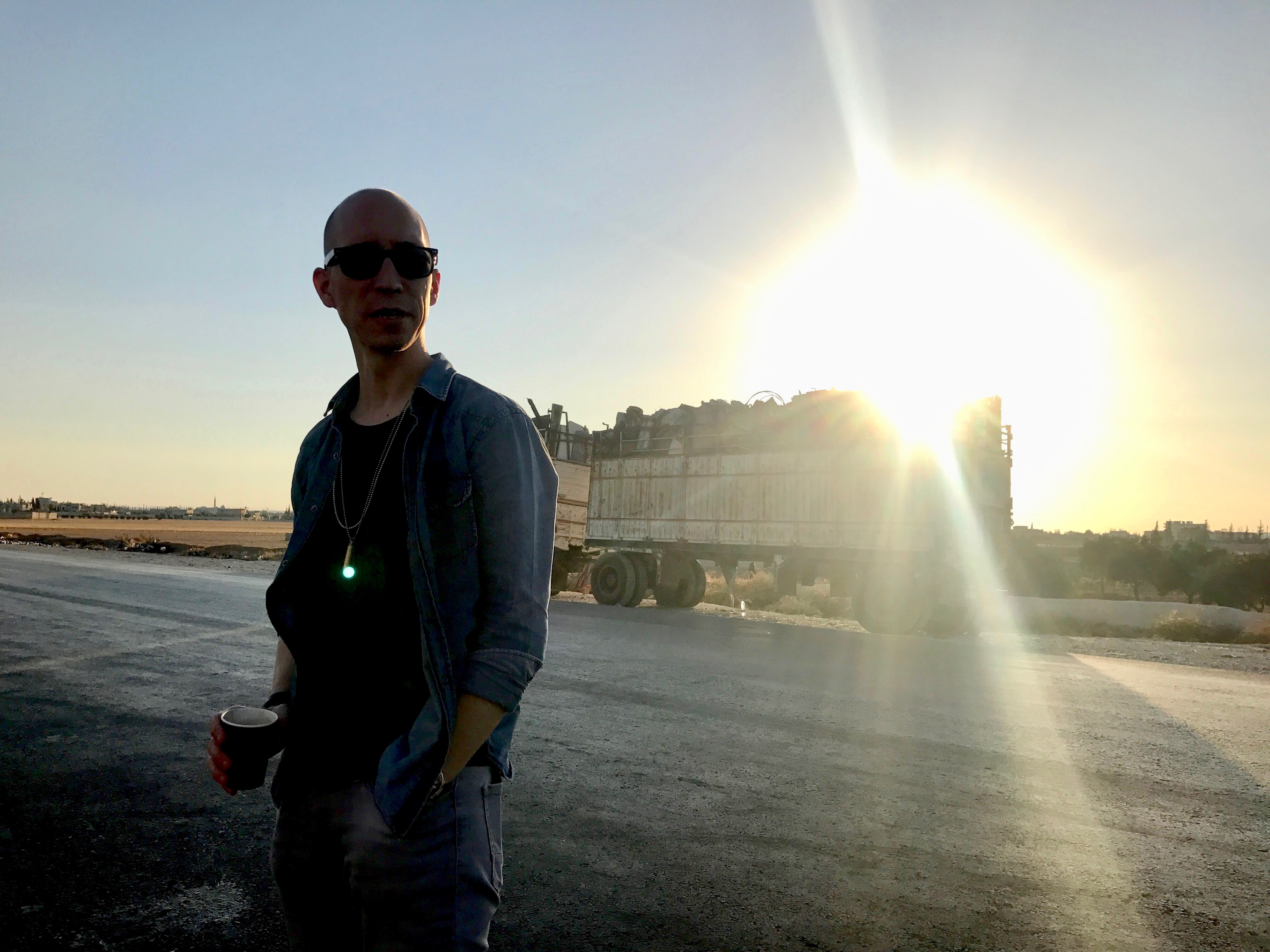
BREAKING: Crisis in NE Syria (And the Ceasefire That Wasn’t)
Preemptive Love is on the ground in Northeastern Syria. This is the biggest crisis we’ve seen at one time…and it’s getting worse. In this breaking episode, hear from our colleagues in the Middle East, who share what they’re seeing unfold.
Share this episode
Show Notes
Preemptive Love is on the ground in Northeastern Syria. This is the biggest crisis we’ve seen at one time…and it’s getting worse. In this breaking episode, hear from our colleagues in the Middle East, who share what they’re seeing unfold.
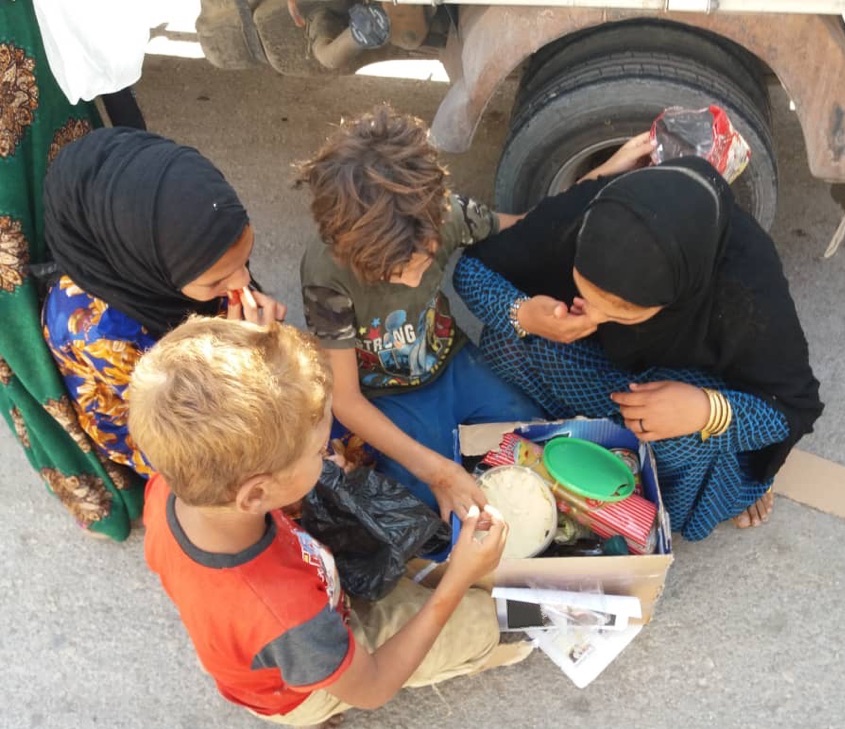
Some of our team members delivering emergency aid have been shot at. Upwards of 300,000 people are running for their lives, fleeing Turkish bombs. The situation is desperate.
We need your help.
In this episode, we breakdown terms like “safe zones” and “ceasefire.” We examine President Trump’s recent statement about the US troop withdrawal from Syria, Turkish bombings, and the massive wave of displacement it triggered.
In this breaking news episode of Love Anyway, we talk with:
- Ben Irwin, director of communications
- Jen Myerson, programs manager
- Erin Wilson, senior field editor in Iraq
Quotes from this episode:
- “The Kurdish people who are stuck in this space…they’re facing one of the biggest humanitarian emergencies that we have seen, one of the biggest displacements that we have seen in our 12 some odd years of working in the Middle East.” Ben Irwin
- “This idea that they have been fighting for centuries and it has nothing to do with us and there’s nothing we can do about it is deeply dishonest. ” Ben Irwin
- “This is a very serious situation. All of these people are worried out of their minds for their family. Some of them haven’t been sleeping in more than a week. Some of them aren’t eating. That’s how worried they are.” Erin Wilson
- “In a lot of the places our team was showing up, what they were hearing from the people that they were serving is: You were the only ones who have reached us. You were the only ones who provided any aid who’ve been here. You’re the only ones we’ve seen.” Ben Irwin
- “Starvation is going to be a real thing soon. At the same time, our food distribution team was under direct attack by multiple locations. So thankfully they hoisted the white flag, they were communicating with other people on the ground for sniper locations. And this allowed everyone to remain safe but distributing food has been extremely dangerous for our team.” Jen Myerson
- “There’s a lot of confusion right now because we’re not just in the middle of a war, or a battle over territory and land and borders. We’re in the middle of a battle over facts and narratives and whose narrative of what’s happening is going to prevail.” Ben Irwin
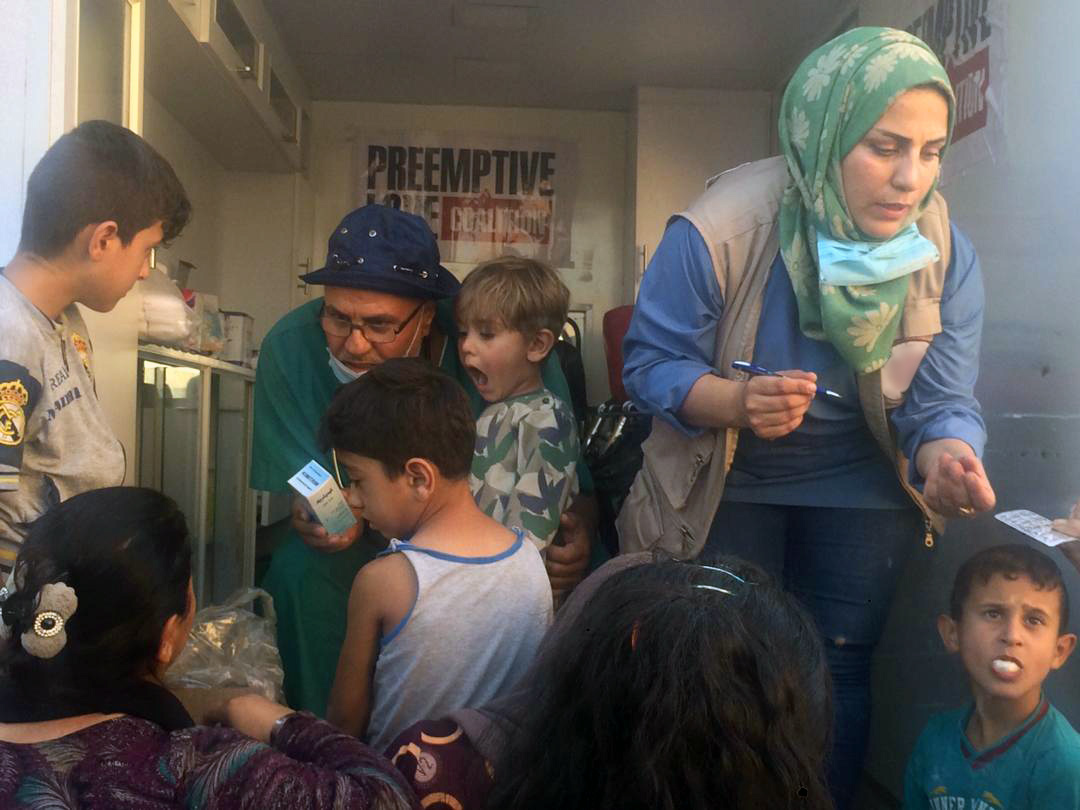 We’re serving on average 200 displaced people per day at our two mobile clinics. Most of the patients are children. Our staff is treating a large number of shrapnel wounds, burn victims, and malnutrition.
We’re serving on average 200 displaced people per day at our two mobile clinics. Most of the patients are children. Our staff is treating a large number of shrapnel wounds, burn victims, and malnutrition.
And people are showing up in need of emergency food faster than we can provide it.
No matter how difficult it gets in northern Syria (and from what we hear from our team, things aren’t looking up yet) one thing is for sure. Choosing to love anyway is worth the risk. We aren’t going anywhere.
But we need your help. Please give now to help save lives. $40 feeds a family for an entire week.
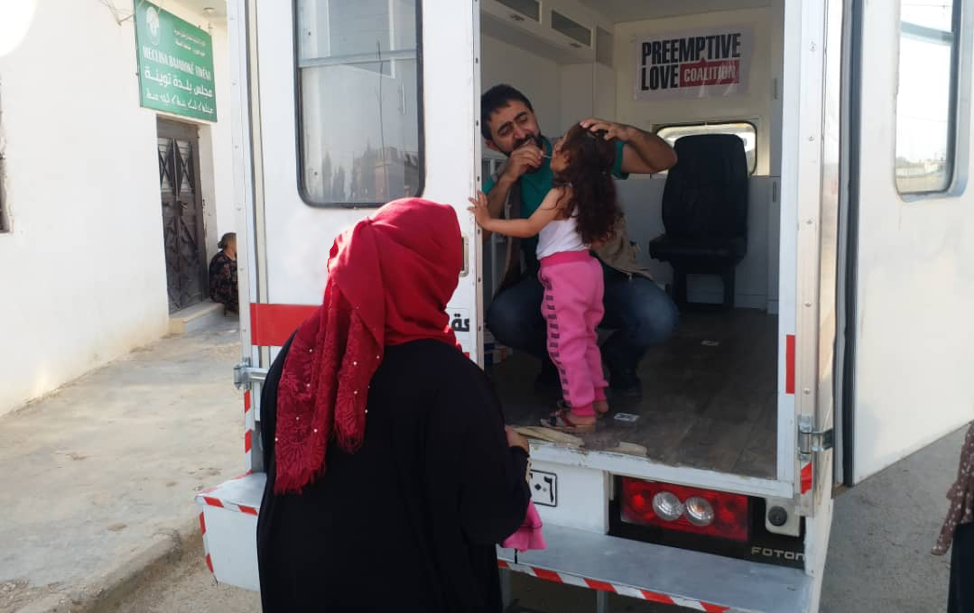
We can’t wash our hands of this situation—but we can stand with and for our friends in Syria.
Additional Resources
Full Transcript
Kayla: Preemptive Love is the ground in Northeastern Syria … and today, we’re breaking in to share what is happening.
You’ll hear from our colleagues in the Middle East, sharing what they’re seeing unfold. This is the biggest humanitarian crisis we’ve seen at one time…and it’s getting worse.
Some of our team delivering emergency aid has been shot at. Up to 300,000 people are running for their lives, fleeing Turkish bombs. The situation is desperate, and we need your help.
I’m Kayla Craig, and this is Love Anyway, a podcast by Preemptive Love.
MUSIC
Ben: So a lot has happened. After several days of some pretty intense conflict on the border between Syria and Turkey, the US and Turkey negotiated what the US called a ceasefire. Turkey disputed that characterization, but essentially, it was a five-day halt in military operations in the region, reportedly to give the Kurdish forces time to get out of this 20-mile-deep, almost 300-mile-long, quote-unquote safe zone that Turkey says it wants to establish between its borders and Kurdish territory.
Kayla: That’s Ben Irwin, who leads our communications team here at Preemptive Love.
Ben: That ceasefire just expired and in place of it Turkey has now turned around and negotiated a deal with Russia. That essentially lets turkey keep all the land that they have seized from the Kurds inside northern Syria. It lets them establish established much of the so-called Safe Zone that they wanted and they will be jointly patrolling this area with the Russians.
As for the Kurds, they were not included in the negotiations between the US and Turkey. They weren’t included in the negotiations between Russia and Turkey so they have in effect been left out in the cold, yet again as other powers decide their fate.
Kayla: So the US troops are gone?
Ben: Most of the US troops are gone. According to the President. A statement that he made earlier today there are a small number of troops remaining in Syria to guard the oil but most of the troops, most of the 1000 or so troops that were left in Syria have since moved out of the country, most of them going into neighboring Iraq.
Kayla: I gave Ben a call moments after President Trump gave a statement addressing his decision to withdraw from Syria, a choice that has received bipartisan criticism.
Trump: Turkey, Syria, and all forms of the Kurds have been fighting for centuries.
MUSIC
And now we’re getting out. Let someone else fight over this long, blood stained sand.
Ben: This idea that they have been fighting for centuries and it has nothing to do with us and there’s nothing we can do about it is deeply dishonest.
Ben: They’re fighting because after World War One, the Kurds were promised their own country by the West, and we didn’t deliver on our promise.
Kayla: what is happening with the Kurdish people that are kind of stuck in this space?
Ben: the Kurdish people who are stuck in this space they are, they’re facing one of the biggest humanitarian emergencies that we have seen, one of the biggest displacements that we have seen in our 12 some odd years of working in the Middle East.
Anywhere from 2-300,000 people have fled their homes since the Turkish offensive began.
To put that in perspective, that’s tens of thousands more who fled the city of Aleppo when it fell in 2016. That’s more than double the number who fled Fallujah, when it was retaken from ISIS a few years ago. It’s a massive wave of displacement. And to complicate things, there aren’t like refugee camps that they can just go to and be safe like families that we’re serving right now. They’re hiding out in schools, they’re hiding and abandoned buildings just anywhere that they can take shelter from Turkish bombs and Turkish shelling and the violence that has been erupting all around them.
Kayla: They don’t magically get to go home, especially if Turkey follows through with its plans to kind of lockdown this area as a so-called Safe Zone. And then, if they follow through with their other plans, they want to deposit two to 3 million Syrian refugees that are currently in Turkey, who were welcomed by Turkey once when they fled war in their own hometowns. But they’re not welcome anymore.
Ben: Public opinion in Turkey has turned against refugees as it has in many other countries. And so Turkey is trying to figure out what to do with these two to 3 million Syrian refugees. And they have not made any secret about the fact that they would like to forcibly relocate these two to 3 million refugees to this so-called Safe Zone that they’re trying to establish. But that safe zone wasn’t unoccupied. before they’re there. They’re having to displace the people who already lived there, in order to forcibly relocate these people who didn’t live here, beforehand. They came from other parts of Syria. So they’re actually going to create multiple waves of displacement on top of each other in the midst of this conflict. And that’s even if all of the fighting all the violence stops today, you still have a massive displacement crisis on your hands.
Trump: In the midst of these ancient, sectarian and tribal conflicts, today’s announcement validates our course of action with Turkey that only a couple of weeks ago was scorned. And now people are saying, Wow, what a great outcome.
Kayla: These are families that just kind of they have nowhere to go.
Ben: Yeah
Kayla: They’ve lost their homes multiple times.
Ben: Yeah. A lot of the people who live in this 281 mile stretch of northern Syria along the border with Turkey. This area is home to a lot of the major Kurdish towns, villages and cities in this part of Syria. So yeah, it’s families, its whole communities. It’s Kurds, its ethnic and religious minorities as well. Yazidis have been displaced, Christian communities have been displaced. Everybody is being impacted by Turkey’s military offensive and now their occupation of Kurdish land.
Ben: We can’t wash our hands of the situation that the Kurds are in right now. There may be no easy solution at this point, but we can’t wash our hands. We can’t pretend like we had nothing to do with this. And I think that’s the biggest concern with the narrative that is coming out of Washington right now is that you know, you know, the cliche if you break it, you buy it. Well, we’re not the only ones who have contributed to brokenness and dysfunction and conflict in the Middle East, but we’ve certainly contribute our to our share to it. And that’s not something you can just walk away from and pretend and be like, okay, we’re done. Now we’re getting out like, by like, yeah, that is that. That’s not fair to the people who have been directly impacted by our actions and our policies for decades.
Trump: We’re achieving a much more peaceful and stable area between Turkey and Syria, including a 20 mile wide, safe zone. An interesting term safe zone, that’s the term we’re using. Hopefully, that zone will become safe.
Ben: There’s a lot of confusion right now, because we’re not just in the middle of a war, or a battle over territory and land and borders. We’re in the middle of a battle over facts and narratives and whose narrative of what’s happening is going to prevail.
Just moments before we got on to record this conversation, the President made a statement in which he claimed that we just saved thousands of lives. Thousands of Kurdish lives were saved by our actions over the last couple of weeks in Syria. In Turkey. And I guess my question is whose lives have been saved. We know a lot of people who have lost their lives in, in the fighting. And we know of many, many more 10s of thousands, hundreds of thousands who have had to flee their home, some of whom may never, ever be able to go back home. as a direct result of the US pulling, it’s very small, true presence out.
It was a very, it was very low investment for the US to maintain hundreds of troops in this region, but a very high return because that actually was maintaining some degree of stability and security between Turkey and the Kurdish region of northern Syria. And now all of that has been blown up.
Trump: The American delegation negotiated the original five day ceasefire that ended Kurdish fighters to safely leave and just got them to a point where frankly, they were able to enable them to get out to go and move really just a few miles in a slightly different direction.
Ben: There’s really two very two competing narratives. There’s a narrative coming out of Washington. And then there is what we are seeing on the ground what our friends who are caught up in this conflict people We’re in conversation with day after day friends in bombarded cities in northern Syria who we spoke with one individual like he had to pause his conversation with us because he had to go out and pull bodies from the streets after the shelling had died down for a moment, and then he came back into talk to us like they are telling a very different story of what’s happening right now. than the one that’s coming out of Washington.
Trump: We have done them a great service and we’ve done a great job for all of them.
MUSIC
Kayla: Erin Wilson is our senior field editor in the Middle East. But more than simply meeting with people to document a story, she genuinely cares for her friends in Iraq whose loved ones are facing bombs, displacement, and sickness in Northeastern Syria. As soon as the news came out that the US was withdrawing its presence and Turkish forces were moving in, Erin immediately visited her Kurdish friends who are intimately connected to the region.
Erin: I mean, this is a very serious situation. All of these people are worried out of their minds for their family. Some of them haven’t been sleeping in more than a week. Some of them aren’t eating. That’s how worried they are.
Kayla: Erin started hearing news that Iraq would be opening its borders to Kurds who have been displaced in northern Syria. But not everyone had access to that news.
Erin: So, over the weekend, I saw reports that maybe that up to 1000 Syrians had been allowed into Iraq, as refugees. Previous to that, Iraq had their border closed. So, Syrian Kurds were not allowed to come into Kurdistan. But they recently opened their borders.
When I was talking to the ladies this morning, I mentioned that and they said, Oh, no, no, the border’s closed, there’s nowhere for them to go. And so, a little while later, we went to another house, we were eating with the ladies before we came back. And the husband was watching the news. And he saw that, I guess 4000 Syrian Kurds had been allowed into Iraq and he shouted at from the living room where he was watching the news on TV.
And immediately Rona and her friend whose house we were at, got on their phones to message their families and say get here you have to get here now. And the one woman she couldn’t get through because the internet is just really bad in Syria right now…you can’t always get it. It’s very hit and miss. Rona was able to talk to her sister and, and first, her sister said, I can’t even get across town right now. There’s been bombings in that area and there’s fires from the bombs and she just couldn’t even couldn’t even fathom how she could get out of town.
Kayla: These friends are desperately trying to stay in contact with their loved ones in Northeastern Syria, doing all they can to help. Because compared to what is now happening in Syria, refugee camps in Iraq are a safe haven.
Erin: Hey guys, this is a more personal story about one of our friends who was at a refugee camp here in Iraq and her sister still in Syria who we spoke with over the phone. When we first met with her last week, she was looking pretty rough to be honest, she hadn’t been sleeping or eating for many days. She is extremely worried about her sister and her family and in Syria, and also has three brothers there. But it’s her sister that she’s the most worried about because of where she lives.
Kayla: Her sister’s name is Shireen. She’s a wife, a daughter, a mother of two young children. And like so many Kurdish people who live in Northern Syria, due to no fault of her own, she and her family are stuck in the dangerous crosshairs of violence.
Erin: And she said that now it’s nearly impossible to leave her house because it’s surrounded by fires made by bombs, and there’s still a lot of shooting there. What she said was, the situation is really not good. We’re afraid of our houses and we don’t know what to do.
Kayla: Erin goes on to give an update that Shireen and her children fled to take shelter in an abandoned school, like so many other Kurds. They’re a people who have been displaced so many times. Home is not an option. The only hope is to make it tomorrow.
Erin: She has a son who’s seven and a daughter who’s three that she’s traveling with. And they’re both really sick.
Erin: Everyone there is terrified because the news that they heard from Erdogan said that Turkish backed forces would bomb and or shoot every place where there are still people living. And so she said, you know, where? Where could they go?
MUSIC
Erin: As of our call yesterday, Kurdish forces were still protecting the area. We asked about availability of food there. She said there are still goods on the store shelves but the prices have already climbed more than doubled than what they were and people were already selling things from their houses. To be able to afford diapers and milk for their kids. And she mentioned that she hasn’t seen her husband in ages, because he’s spending all this time helping displaced families there. So, this is Shireen’s story. The last we talked to her sister when we left there, they didn’t yet know about the possibility of getting into Iraq. And I have not heard an update today. If they had been able to escape or if they’re still there.
MUSIC
Kayla: We’re serving on average 200 displaced people per day at our 2 mobile clinics. Jen Myerson is our programs manager at Preemptive Love. She sent this update to the team.
Jen: As more and more and move out of the city and start to move south, they’re thinking that they might see more gatherings in these abandoned schools on these roads. So our doctors are seeing on average 100 patients a day and the ambulances each…That’s 200. 75% are children. They’re seeing a lot of sicknesses and concerns but they’re also treating a large amount of shrapnel wounds, burn victims and then malnutrition. She also mentioned how gender-based violence is, has been recorded a lot more than in other areas that we have clinics.
Kayla: And people are showing up in need of emergency food faster than we can provide it.
Jen: Starvation is going to be really a real thing soon. At the same time, our food distribution team was under direct attack by multiple locations. So thankfully they hoisted the white flag they were communicating with other people on the ground for sniper locations. And this allowed everyone to remain safe but distributing food has been extremely dangerous for our team.
Kayla: And getting information to and from northeastern Syria? It’s complicated. Jen sent a message explaining a conversation with a team member who is on the ground.
Jen: I just keep asking for reports and photos and stories. And she explained how the military has pressed down on a zero phone service and zero internet. So information is like delivered from a USB from one person to another to another and then gets to her.
Jen: They feel pressed down. She said that she’s struggling, which I’ve never heard her say before, of just feeling very, very crushed on multiple sides.
MUSIC
Kayla: No matter how difficult it gets in northern Syria…and from what we hear from our team… things aren’t looking up yet…one thing is for sure. Choosing to love anyway is worth the risk. We aren’t going anywhere. But we need your help.
Ben: In a lot of the places our team was showing up, what they were hearing from the people that they were serving is you were the only ones who have reached us. You were the only ones who provided any aid who’ve been here. You’re the only ones we’ve seen.
Ben: They are having to find families who are hiding who are taking shelter in abandoned buildings and schools. We’ve got two mobile medical clinics that have deployed to treat everything from shrapnel wounds to burn victims. They’re seeing cases of malnutrition and then of course, all of the usual kind of everyday medical needs that require attention. They’re treating those As well, they’re handing out, ready to eat food packs. When you’re on the run, it’s not like you can bring the stove with you. So we’re having to distribute food that people can eat right then and there. So we’ve been handing out these week-long food packs. The other day, we got a call from our team, kind of an urgent call saying, the food is gone, like we have…we have handed out everything we had, and there are more people coming.
Kayla: Every last food pack has been given out to families on the run, and more families are more coming.
Ben: The best thing is to donate. And if you can donate monthly, that is even better, because we don’t just have our eye on the immediate crisis on the immediate needs of families. Yes, we are providing food, we’re providing medical care. We’re coming into winter and a lot of people don’t realize winter is cold in Syria, like it can snow it can drop below freezing there. So we have to think about what a shelter going to look like for these families. We have to think about what whether they are ever able to go home or not, what kind of livelihood what kind of jobs, what kind of work will they have available to them so that they can provide for themselves so they can get back on their feet and rebuild their lives these are the conversations we need to be having now.
MUSIC
Ben: We have to show up. We have to meet them where they are, and we have to stay with them. Then I mean, the cameras are going to move on and the news cycle at some point is going to move on from Syria. The question is, are we going to move on with them? Are we going to stay and stand by our friends who have been abandoned by some of their most crucial allies in the last couple of weeks and feel like the whole world has an effect turned its back on them. Are we going to be the ones who stand with them for the long haul? Not just for the initial wave, but for the years of rebuilding and reclaiming their lives that are ahead of them?
MUSIC
Kayla: Please give now to help save lives. $40 feeds a family of 6 for an entire week. Visit preemptivelove.org/podcast, where you can give, knowing your money is going directly to families who need it most in Syria.
Kayla: Thanks for listening to this breaking news episode. Remember to subscribe so you don’t miss an update.
Until next time, I’m Kayla Craig. And this is Love Anyway, a podcast from Preemptive Love.
MUSIC

